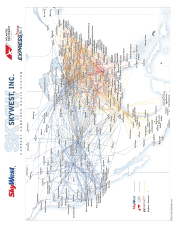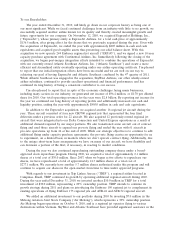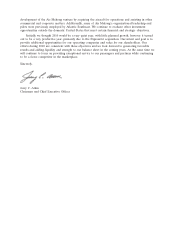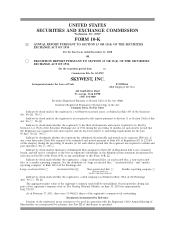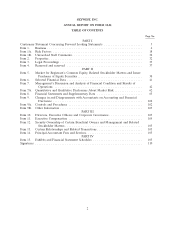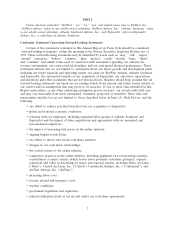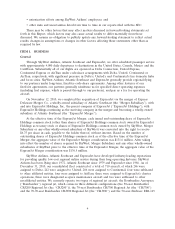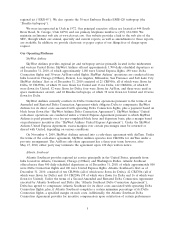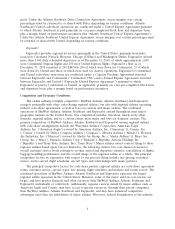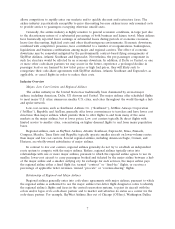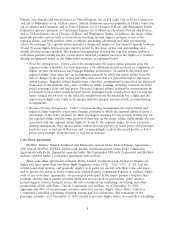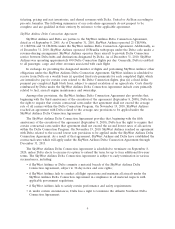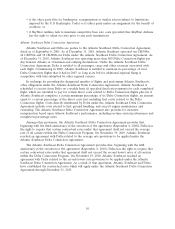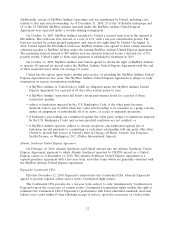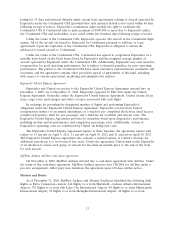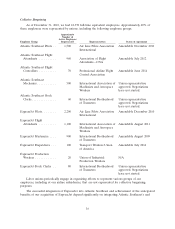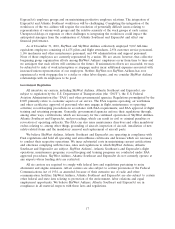SkyWest Airlines 2010 Annual Report Download - page 12
Download and view the complete annual report
Please find page 12 of the 2010 SkyWest Airlines annual report below. You can navigate through the pages in the report by either clicking on the pages listed below, or by using the keyword search tool below to find specific information within the annual report.Denver, Los Angeles and San Francisco as United Express, out of Salt Lake City as Delta Connection
and out of Milwaukee as an AirTran carrier. Atlantic Southeast operates primarily as Delta Connection
out of Atlanta and Cincinnati and as United Express out of Chicago (O’Hare) and Washington Dulles.
ExpressJet operates primarily as Continental Express out of Houston, Cleveland, Newark and Denver,
and as United Express out of Chicago (O’Hare) and Washington Dulles. In addition, the major airline
generally provides services such as reservations, ticketing, ground support and gate access to the
regional airline, and both partners often coordinate marketing, advertising and other promotional
efforts. In exchange, the regional airline provides a designated number of low-capacity (usually between
30 and 70 seats) flights between larger airports served by the major airline and surrounding cities,
usually in lower-volume markets. The financial arrangements between the regional airlines and their
code-share partners usually involve contractual or fixed-fee payments based on the flights or a revenue-
sharing arrangement based on the flight ticket revenues, as explained below:
•Fixed-Fee Arrangements. Under a fixed-fee arrangement, the major airline generally pays the
regional airline a fixed-fee for each departure, with additional incentives based on completion of
flights, on-time performance and baggage handling performance. In addition, the major and
regional airline often enter into an arrangement pursuant to which the major airline bears the
risk of changes in the price of fuel and other such costs that are passed through to the major
airline partner. Regional airlines benefit from a fixed-fee arrangement because they are sheltered
from most of the elements that cause volatility in airline earnings, including variations in ticket
prices, passenger loads and fuel prices. However, regional airlines in fixed-fee arrangements do
not benefit from positive trends in ticket prices, passenger loads or fuel prices and, because the
major airlines absorb most of the risks, the margin between the fixed-fees for a flight and the
expected per-flight costs tends to be smaller than the margins associated with revenue-sharing
arrangements.
•Revenue-Sharing Arrangements. Under a revenue-sharing arrangement, the major airline and
regional airline negotiate a proration formula, pursuant to which the regional airline receives a
percentage of the ticket revenues for those passengers traveling for one portion of their trip on
the regional airline and the other portion of their trip on the major airline. Substantially all costs
associated with the regional airline flight are borne by the regional airline. In such a revenue-
sharing arrangement, the regional airline realizes increased profits as ticket prices and passenger
loads increase or fuel prices decrease and, correspondingly, realizes decreased profits as ticket
prices and passenger loads decrease or fuel prices increase.
Code-Share Agreements
SkyWest Airlines, Atlantic Southeast and ExpressJet operate under United Express Agreements
with United. SkyWest, SkyWest Airlines and Atlantic Southeast operate under Delta Connection
Agreements with Delta, ExpressJet operates under the Continental CPA with Continental and SkyWest
Airlines operates under a code-share agreement with AirTran.
These code-share agreements authorize Delta, United, Continental and AirTran to identify our
flights and fares under their two-letter flight designator codes (‘‘DL,’’ ‘‘UA’’ ‘‘CO’’, or ‘‘FL’’) in the
central reservation systems, and generally require us to paint our aircraft with their colors and logos
and to market our status as Delta Connection, United Express Continental Express or AirTran. Under
each of our code-share agreements, our passengers participate in the major partner’s frequent flyer
program, and the major partner provides additional services such as reservations, ticket issuance,
ground support services and gate access. We also coordinate our marketing, advertising and other
promotional efforts with Delta, United, Continental and AirTran. As of December 31, 2010,
approximately 89% of our passenger revenues related to contract flights, where Delta, United or
Continental controlled scheduling, ticketing, pricing and seat inventories. The remainder of our
passenger revenues as of December 31, 2010 related to pro-rate flights, where we controlled scheduling,
8


